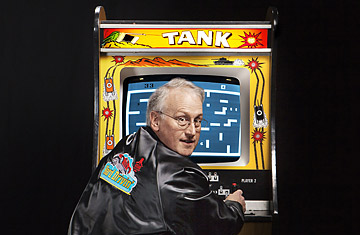
Lyle Rains, Tank. His 1974 multi-joystick game rolled out several sequels. His new target: Angry Birds.
In Silicon Valley in the late 1970s and early '80s, the closest thing to being a rock star was working for Atari. The company that introduced the video game to the masses kept its engineers' creativity flowing with free meals, Friday beer bashes and weekend "gamestorming" retreats on the California coast that featured naked hot-tub parties, fat doobies, food fights, broken coffee tables and locked doors ripped out of their frames. "We partied like hell," says Rob Zdybel, a former Atari console programmer who at 55 still wears his hair shaggy and his vintage T-shirts Grateful Dead.
Thirty years later, the band is getting back together. Zdybel and nine other programmers and designers from the company's wild early days--the makers of Asteroids, Centipede, Missile Command and the like--have come out of retirement or semiretirement to try to revive some of the magic of gaming's so-called golden age. In 1982 playing a video game meant a trip to the arcade with a fistful of quarters. In 2012 playing a video game increasingly means turning on an iPad. The 99 download has become the new quarter drop, and the old Atari guys see the new medium as an opportunity to rethink classic game play.
Their target audience isn't the hardcore gamers who immerse themselves in virtual worlds for hours upon hours but rather what the industry has started calling "casual gamers," people who play a bit of FarmVille at work or Angry Birds on their phones. The games that appeal to this demographic have a low barrier to entry. They're cheap and convenient, like a quick game of Pac-Man at the pizza parlor. "We've come full circle," says one of the reconstituted Ataristas, Owen Rubin, 57, who in 1983 unleashed Major Havoc. "The iPad and the iPhone--they're the new arcade."
The group's new company takes its name from an expired Atari slogan: Innovative Leisure. Its founding partners believe the industry has been coasting on fancy graphics for too long and that old skills and retro sensibilities are valuable again. "We were inventing genres back then," says Rubin, and he lists them: driving games, shooters, side-scrolling platform games and maze and puzzle games. The 10 coders--seven from Atari's arcade-game division, two who specialized in making game cartridges for its home consoles and a designer for an Atari archrival, Cinematronics--are all bald or graying and refer to themselves as "grizzled old farts."
They also think most of the new games on the market stink. "World of Warcraft?" says the oldest of the bunch, Bruce Merritt, 63, dismissing the popular massively multiplayer role-playing game. "The whole premise is one we wore out 30 years ago playing Dungeons & Dragons." Merritt and his colleagues, not lacking in ambition, say now that they are back in the game, they don't just want to have a WoW-size hit. They aspire to invent new mechanisms of game play, maybe even new genres.
Space Cowboys
